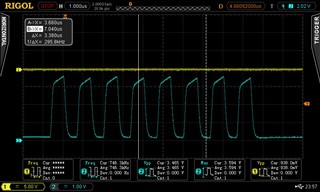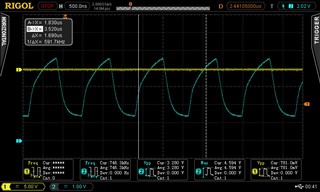Other Parts Discussed in Thread: TXU0204, TXU0304, SN74LXC8T245, SN74AVC8T245, SN74AXC8T245
Hello team,
I am using the LSF0204 as a level shifter from 3.3V to 5V but we have experienced an unexpected behavior at the output. We tried different pull-ups and the output is not good. This is our circuit.
and this is the output

As you can see, the output is not reaching the 5V and the signal looks bad. The frequency is not really high, it is lower than 1 MHz. We have changed the value of the pull-up and there is a similar behavior, just a different offset. Another detail is that the maximum level is not reaching the 5V, just if the resistor is smaller according to the datasheet values.

Could you please advise about it?
Thanks
Francisco

